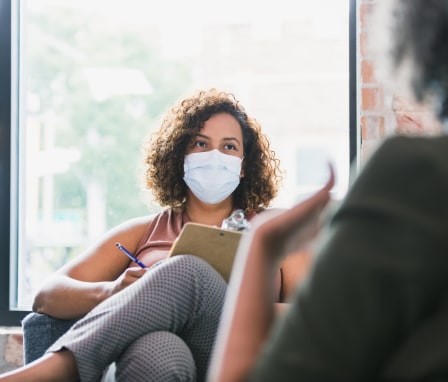 Credit: SDI Productions / E+ / Getty Images
Credit: SDI Productions / E+ / Getty Images
The global pandemic has changed how counselors support patients, including accounting for a surge of COVID-19 related anxiety and depression. This public health crisis has led counselors to develop new approaches and adapt remote technologies to provide appropriate care within social isolation and safety guidelines.
Counselors experience the same COVID-induced fears and frustrations as their patients. Many must cope with losing clients, family and financial hardships, and emotional stress that the virus has unleashed.
This guide explores the ways in which counselors' roles and responsibilities have changed since the COVID-19 outbreak. Keep reading for some ways counselors can manage stress in their professional and personal lives.
The Role and Impact of Counselors During a Pandemic
The COVID-19 virus has created a public health crisis of unprecedented proportions. Since the pandemic's onset, counselors have witnessed an uptick in patients dealing with the loss of normalcy in their daily lives.
Counselors provide information and support for patients experiencing employment disruptions and related financial woes, school cancellations, concerns about the health of their relatives and themselves, and grief at losing family and friends. GinaMarie Guarino, a licensed mental health counselor who works with patients affected by the virus, observes that the pandemic "has drastically changed how the world functions, and as a result many have experienced severe reactions to their mental health. Conditions of anxiety, depression and grief have all spiked considerably in reaction to COVID-19."
Stephanie Waitt, a licensed counselor whose practice focuses on eating disorders, trauma, depression, and anxiety addresses the challenges the pandemic has placed on counselors as they adjust to meet their patients' mental healthcare needs:
"A public health crisis like this has only exposed people's traumas and anxieties and therapists are needed now more than ever. We are validating a lot of people's struggles right now and giving people permission to be a little messy…"
In these times, she suggests that counselors should prioritize creating a safe space for patients.
Featured Online Programs
Figuring out where to apply? These top, accredited schools offer a variety of online degrees. Consider one of these accredited programs, and discover their value today.
How Patient Visits Have Changed
Pandemic-related social isolation has led counselors to develop new strategies for supporting patients who can no longer schedule office visits. When COVID-19 first hit, counselors experienced a sudden decline in patient appointments. However, as the epidemic spread, more people began to seek out online counseling services to address their mental health challenges.
Telehealth, or distance counseling using audio and video technology, allows counselors to reach clients across a wide geographical area. For example, the pandemic has affected patients dealing with eating disorders by limiting their sources of safe foods and restricting travel to meet with support groups. Waitt asserts that video therapy has saved lives, helping "more people get more eating disorder care and treatment …when they did not have a specialist in driving distance."
Telehealth counseling does pose some challenges. In addition to technological access, patients need a private place for their sessions. Without in-person interaction, counselors sometimes encounter difficulty interpreting nonverbal cues.
On the other hand, Guarino sees the transition to online therapy as "a viable option for receiving counseling services. While it may not be for everyone, switching to telehealth has been a good experience for both therapists and clients."
The Impact on Counselors
The global pandemic raises questions about how professional roles and responsibilities have evolved, the effectiveness of telehealth, and whether a mental health pandemic will occur after the virus has subsided.
While the spread of COVID-19 has, in some cases, increased the demand for counseling, it has also created financial disruption and emotional stress for therapists and patients alike. Like Waitt, some counselors report sharp increases in their private practices. Others have seen a decline in their caseloads due to lost insurance benefits or healthcare policies that only cover in-person appointments.
The transition to telehealth has required many counselors to adjust their counseling methods and routines. Working from home requires appropriate and private spaces free from family interruptions and external noise. Waitt acknowledges that the adjustment to online counseling has been awkward, but, with careful preparation, telehealth serves as an equally effective alternative to in-person sessions. She cautions counselors in these difficult times to "remain compassionate and offer people grace so they can figure out how to adjust and adapt healthfully."
Most importantly, while counselors continue to focus on addressing their patients' mental health needs, they must also follow their own advice, recognizing their own vulnerabilities and making time for self-care.
Self-Care Tips For Counselors During Coronavirus
The American Counseling Association and professional publications for therapists offer several tips for personal and professional self-care.
- Avoid burnout and exhaustion by maintaining contact with other professionals through support groups and peer counseling sessions.
- Develop a regular wellness routine that includes activities such as a daily walk, yoga, meditation, and other practices that reduce stress.
- Maintain a daily stable schedule, observing regular bedtimes and meal times, and adhere to a healthy diet.
- Counselors offering teletherapy can separate work and personal life by making home office spaces, such as bedrooms or family rooms, look like professional spaces.
- Professionals offering in-person sessions should follow safe procedures, maintain social distance, enforce masking rules, and sanitize their spaces between client appointments.
Resources for Counselors
- American Counseling Association: The ACA website offers COVID-related professional resources for counselors and telehealth providers, including continuing education opportunities.
- Center for Disease Control and Prevention COVID-19 Resources: The CDC maintains a frequently updated compilation of information on prevention, symptoms, testing, and coping with the virus.
- Department of Health and Human Services/Coronavirus (COVID-19): This webpage provides links to current COVID initiatives, federal funding opportunities, and information on HIPAA-covered telehealth services.
- Headspace: This online platform offers a free meditation app for those impacted by COVID-19, along with other wellness resources.
Our Contributors

GinaMarie GuarinoGinaMarie Guarino is a licensed mental health counselor serving New York and Tennessee residents who have been affected by COVID. |
Stephanie Waitt
Dr Stephanie Waitt is a licensed professional counselor and certified eating disorder specialist. She loves treating eating disorders, trauma, anxiety, and depression at her practice, Texoma Specialty Counseling. Stephanie began her career treating eating disorders in 2006 at Timberline Knolls and has worked in inpatient and outpatient settings since that time. She started her practice in 2016 and quickly realized the lack of support, treatment, and resources for individuals dealing with eating disorders. Stephanie believes that eating disorder education and advocacy are important to making treatment more accessible. She enjoys opportunities to teach others about how fun treating eating disorders can be! Stephanie has presented at professional conferences about eating disorder treatment and assessment. She has been featured on popular podcasts like Positive Nutrition, Body Love Project, Abundance Practice Builders, and has had blogs published by ProjectHeal, Balance Treatment, NEDIC, and Thrive Global. Stephanie has also been featured on local news channels for her expertise in treating eating disorders and growing a successful specialty private practice. In her work with young men and women she aims to help individuals find balance, peace, confidence, and happiness with their bodies, relationships, and life. She emphasizes the importance of self-care and assures people that being a little selfish is a really good thing. Stephanie helps people find peace with their bodies, gain confidence, and live the life they want right now. Social Links
|

